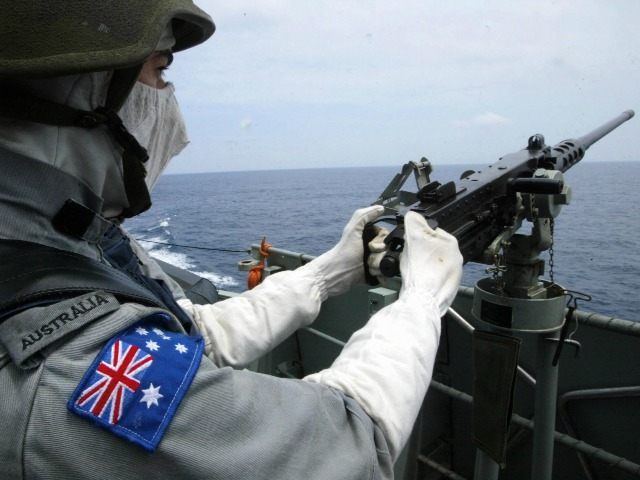The Chinese government is warning the United States and its allies to stop “adding fuel to the flames” in the longstanding territorial dispute in the South China Sea, following a joint announcement by America and Australia that the nations fully intend to exercise their right to navigate the body of water, which China claims entirely for itself.
“It would be more helpful if they could honour their commitment of not taking sides on relevant disputes and do more to promote regional peace and stability in the true sense of the words rather than light a fire and add fuel to the flames,” the Chinese embassy in Australia said in a statement Wednesday, following a joint statement from Australian Foreign Minister Julie Bishop and Secretary of State Ashton Carter regarding the South China Sea. China added that it was “seriously concerned” about an American and Australian presence in the South China Sea and urged “the relevant sides to stop applying double standard.”
Australia and the United States agreed in a joint meeting of high-ranking defense officials in Boston to “enhance naval cooperation across all domains” and wrote that they were both “seriously concerned” about the construction of artificial islands and deployment of military equipment by China in the South China Sea’s international waters.
“We have a very strong agreement to pursue enhanced naval cooperation, which will include additional combined training and exercises between our two navies,” said Australian Defense Minister Marise Payne. Carter made clear, meanwhile, that the United States did not intend to ask China for permission to sail in international waters: “The United States will fly, sail and operate wherever international law allows.”
“The South China Sea is not and will not be an exception,” he added.
Carter added that the official American position is to not opine on “sovereignty issues” but to “call for all parties to halt further reclamation and any further militarization of features in the South China Sea.”
China has been accelerating the development of military assets in the region since 2013, building jet landing strips, lighthouses, and a number of unidentified facilities discovered by overhead satellites. Much of this construction is occurring in territory other nations– such as the Philippines, Vietnam, Malaysia, and Brunei– claim as their own or perceive as international waters. In the process, the Chinese military has, on occasion, attacked international vessels it claims trespassed into Chinese waters. Environmental groups have accused China of destroying at least 17 reefs to build its artificial islands.
In addition to natural resources possessed by the territory, the South China Sea is a richly trafficked trading route, making it an attractive claim for China. The Wall Street Journal explains:
The South China Sea is home to rich natural resources and half of all global shipborne trade: some $5 trillion a year in oil, food, iPhones and more. By asserting “indisputable sovereignty” over its nearly 1.35 million square miles, including vast swaths of sea belonging to its neighbors, Beijing threatens to hold hostage—and to wage war over—the economic heart of East Asia.
In addition to the Chinese embassy’s statement, a column in the official China Daily has condemned the United States for “giving unprincipled protection” to China’s neighbors and “using ‘free navigation’ as an excuse to interfere in the regional territorial disputes.”
The Chinese government has consistently condemned the United States for “militarizing” the South China Sea while boasting of its own militarization of the region. In July, Defense Ministry Spokesman Yang Yujun claimed China was “greatly concerned about the United States’ push to ‘militarize’” the region. Months later, on Wednesday, China Daily posted a report citing an expert warning that China now has the capability to launch precision strikes. “In the past, our bombers could only deliver airdropped bombs and so were unable to conduct precision attacks,” said expert Fu Qianshao, but now, with H-6K bombers, China “can take out multiple targets on the ground or at sea within one mission.”

COMMENTS
Please let us know if you're having issues with commenting.